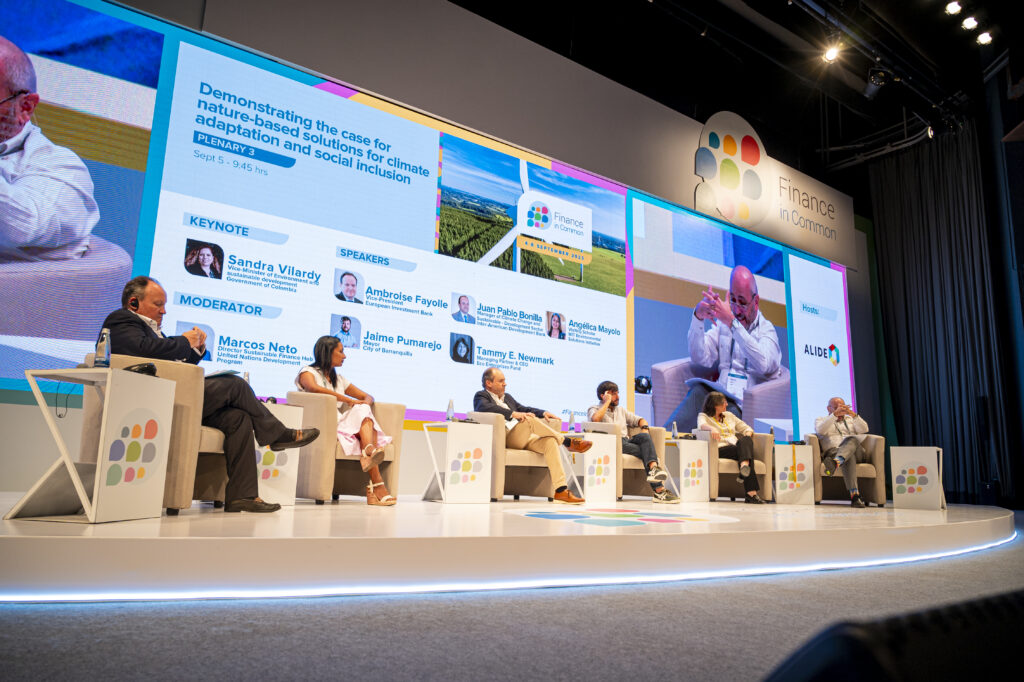PLENARY 3 (DAY 2)
Urgent Natural Solutions Against Climate Change
- During the fourth edition of Common Finance, experts, leaders of development banks, and government officials warned of the need for alliances, governance, public policies, and dedicated resources to finance climate solutions projects.
- One of the challenges for ensuring the future is developing nature-based solutions that protect ecosystems, preserve biodiversity, and safeguard water sources.
Cartagena (Colombia), September 5, 2023. In addition to strengthening an appropriate coordination of resources and efforts of the world’s public development banks and private banking to address priorities such as poverty and hunger, building strategies for the protection of ecosystems that can contribute to global climate change mitigation and thus safeguard millions of people will be crucial in the decades to come.
As the experts who participated in Plenary 3 (Nature-Based Solutions for Climate Adaptation and Social Inclusion) emphasized, one of the tasks to be reinforced is developing nature-based solutions that protect ecosystems, preserve biodiversity, water sources, and soil to improve the quality of life for communities.
One of the debates focused on the fact that developing countries will require alliances, stronger governance, public policies, and dedicated resources to successfully finance nature-based climate solutions projects, all while keeping social inclusion in mind.
Juan Pablo Bonilla, Manager of the Climate Change and Sustainable Development Sector at the Inter-American Development Bank (IDB), stated during the plenary that “it has been proven that the generation of economic value in the world, $44 trillion (more than 50% of the total world GDP), depends moderately or highly on nature and its services. The loss of nature is of great importance to most companies, through impacts on operations, supply chains, and markets.”
Bonilla thus added, “from 2015 to 2020, the IDB invested over $800 million in 28 projects with nature-based solution components. These projects mobilized an additional $437 million in financing from partners, which equals nearly $1.25 billion in total project financing.”
Nevertheless, Bonilla called for an increase in nature-based investments and highlighted the following data: “Every $1 invested in mitigation saves $6 in future disaster costs, but every $1 invested in restoration generates up to $30 in economic benefits. It’s a business opportunity.”
Additionally, and with support of the government of Canada, the IDB also recently approved a Nature-Based Solutions accelerator that will initially operate in Mexico, Colombia, Brazil, and Belize; it is also seeking resources to scale to other countries.
On another note, Sandra Vilardy, Deputy Minister of Environment and Sustainable Development of Colombia, also participated in the plenary and said, “We cannot afford to misuse nature in facing challenges. Climate inaction is costly. We need to recover the nature lost, which will allow us to move towards a productive economy in times of climate crisis.”
She also pointed out that, “to the extent that we can determine how much biodiversity contributes to the economy, we can make more effective (and fair) investments in this purpose. We need to do the math. And here, communities must also be considered as conservators of biodiversity.”
Regarding environmental projects that serve as a reference in Colombia, the Mayor of Barranquilla, Jaime Pumarejo, explained to the attendees that the local government is working on making the restoration of the Mallorquín Marsh a reality; the marsh is a 650-hectare coastal lagoon that will not only be crucial for preserving biodiversity but also for protecting the Atlantic capital from the future effects of climate change, such as rising sea levels.
“In the Mallorquín Marsh, we have used the local algae to clean and preserve this body of water, as well as a tributary that carried wastewater to this marsh,” said Mayor Pumarejo, who explained that the Barranquilla Mayor’s Office has worked on creating urban forests to regulate temperatures. “Most of these projects are undertaken in collaboration with communities,” he added.
The participants in Plenary 3, where experts showcased examples of effective investments in natural ecosystems that are already contributing to slowing global warming, included Sandra Vilardy, Deputy Minister of Environment and Sustainable Development of Colombia; Ambroise Fayolle, Vice President of the European Investment Bank (EIB); Juan Pablo Bonilla, Manager of the Climate Change and Sustainable Development Sector at the Inter-American Development Bank (IDB); Angélica Mayolo, Consultant for MIT Environmental Solutions Initiative and former Minister of Culture of Colombia; Tammy Newmark, CEO of Eco Enterprise Fund; and Jaime Pumarejo, Mayor of Barranquilla (Atlántico).
In the search for a more ambitious climate action
Since the COP 27 summit (held at the end of 2022), in which ministers from 27 nations called for more ambitious global climate action, the WWF organization highlighted that nature is now a crucial (and silent) ally against warming and that it also contributes to achieving the goals of the Paris Agreement.
According to WWF, various terrestrial ecosystems absorbed 31% of human-emitted CO2 emissions, while oceans took up an additional 23%; oceans have also borne a high cost due to increased water acidity.
As WWF states, having healthy ecosystems helps keep communities safe from impacts. These can include wetlands, mangroves, and coral reefs that ultimately become barriers against surges. However, this organization points out that heatwaves, fires, and other factors can jeopardize the natural balance.


